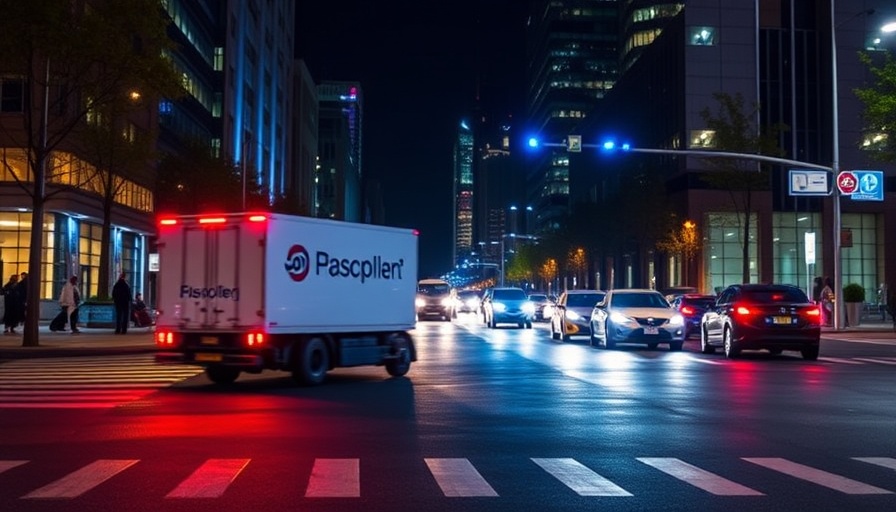
The Resurgence of Logistics and Mobility Startups in Africa
In the ever-evolving landscape of technology investments, the logistics and mobility sectors in Africa are showing signs of renewed vitality. After a tumultuous funding journey that saw investments drop significantly in 2023, there is a notable resurgence. According to the recent report from Africa: The Big Deal, the broader tech ecosystem in Africa reached an impressive $1.4 billion in deal flows for the first half of 2025, reflecting a remarkable 78% growth compared to the same period in 2024. Although funding for logistics and mobility startups totaled $115 million, down from the previous year, it underscores the sector's sustained appeal.
Top Investment Highlights of H1 2025
The first half of 2025 was marked by several significant funding rounds for logistics and mobility startups, indicating a strong market presence amid ongoing challenges. Here's a closer look at some of the most noteworthy deals:
1. Gozem: A Francophone Super App
Leading the pack is Gozem, raising a substantial $30 million in a Series B funding round. This investment, largely contributed by SAS Shipping Agencies Services and Al Mada Ventures, will drive vehicle acquisitions and facilitate Gozem's expansion into new markets. The app's comprehensive services ranging from ride-hailing to digital banking illustrate the increasing demand for integrated mobility solutions across West and Central Africa.
2. Sylndr: Digitizing the Used Car Market
Sylndr, a startup located in Cairo, secured $15.7 million to enhance its used car marketplace. The backing from investor groups like DPI’s Nclude Fund and Partech marks a significant step towards digitizing vehicle sales and financing in Egypt—a move that could transform the marketplace into a seamless platform for users.
3. Peach Cars: Tackling Trust in Used Vehicles
With $11 million raised in Series A funding, Peach Cars is addressing crucial issues in the used car sector by implementing advanced auto-verification technology. This initiative comes at an essential time as the industry grapples with fraud and unreliable appraisal processes.
4. MyNextCar: Fleet Leasing in South Africa
In South Africa, MyNextCar raised $10 million to expand its fleet and support Bolt’s ride-hailing services. Their approach emphasizes not only expansion but also enhancing earning opportunities for drivers—reflecting a growing recognition of the gig economy's significance in urban transportation.
5. Kofa: Pioneering Clean Energy Solutions
Kofa's $8.1 million round highlights the emergence of clean tech in the mobility sector, focusing on AI-powered battery swapping for electric motorcycles and homes. This innovation not only promotes sustainability but also addresses the need for reliable infrastructure for growing electric vehicle markets across Africa.
Understanding the Trends Behind the Numbers
While this year's funding may be lower than the record highs of 2022, it signals cautious optimism among investors about the future of logistics and mobility in Africa. The trends showcase a pivot towards integrating technology in transportation and logistics, addressing both consumer needs and regulatory challenges.
Future Implications for Logistics and Mobility Startups
As we look forward, these funding rounds create ripple effects throughout the industry. Increased competition could drive innovation, leading to improved services and customer experiences. Furthermore, with a focus on sustainability in energy and transportation solutions, startups like Kofa are paving the way for a cleaner and more efficient future for the continent's urban mobility.
The Global Context: A Comparative Perspective
Globally, logistics and mobility markets have been rapidly evolving, especially in developed economies that are leveraging advanced technologies such as AI, big data, and automation. Africa's unique challenges and opportunities present a contrasting yet complementary narrative. As these startups receive funding, they can potentially contribute valuable insights and innovative solutions to the global market, particularly in addressing effective logistics in emerging economies.
Concluding Thoughts
The current funding environment for logistics and mobility startups in Africa illustrates a complex interplay between investor confidence, technological advancements, and market needs. As we continue to witness these developments, it becomes ever more essential for stakeholders and potential investors to understand the emerging trends and engage with Africa's vibrant startup ecosystem. By staying informed and actively participating, we can encourage a more progressive landscape for logistics and mobility in the region.
 Add Row
Add Row  Add
Add 




Write A Comment